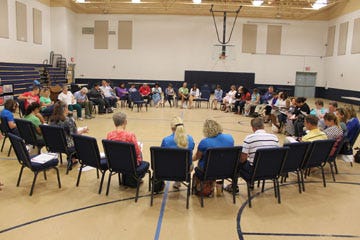
Seven judges attended the Santa Rosa County Bridges out of Poverty simulation Saturday at the Guy Thompson Community Center among other attendees with various social services. While Dr. Karen Barber, president of SRC Bridges out of Poverty, said the names of the people the attendees played were fake, but the situations were real.
The simulation has participants take on the roles of families in poverty dealing with youth pregnancy, unemployment, paying bills, and other issues made more difficult for those with low income. Through the simulation, some families found themselves evicted from their homes and suddenly in need of emergency shelter while others dealt with lawbreakers in the family.
Phyllis Gonzalez with the Department of Children and Families said this was her fifth poverty simulation. She played two roles: the owner of a Cash Advance and the owner of a pawn shop. Gonzalez said she likes doing these exercises because people tend to have unrealistic expectations of those in poverty. She said she likes to “see light bulbs,” when participants gain a new understanding.
Robin Wright said she was playing a grandmother disabled due to a stroke who needed money since her utilities were about to be shut off. So she took a few items (pictures of a camera on a laminated card) to the pawn shop to keep the lights on. “You appreciate what families have to deal with, just the stress,” she said.
Kiara West, a health department employee, said she played a young pregnant girl who had no motivation to buckle down in school. “I think people who are homeless are misunderstood. People don’t know the situation,” she said. West said her boyfriend, in the simulation, stole some of her property but wasn’t concerned about him since he was in jail.
During the debrief segment after the simulation, Judge John Miller said, “The first thing I felt was anxiety. Are we going to be able to do everything we needed to get done in the time that we had to get it done. And are we going to have enough resources?” Miller said another participant played his girlfriend who had a baby not belonging to him. He said, “If I wanted to be totally selfish, she would have been out on the street.”
Occasionally, services such as the Social Services table or the Utilities table would be unmanned. Participants found themselves needing to get help or pay bills and would be unable to do so. Barber said this could represent any reason a service may be closed such as a holiday. The most common complaint participants had during the simulation Barber pointed out was frustration. She said, “And this was only an hour.”
This article originally appeared on Santa Rosa Press Gazette: Bridges holds poverty simulation
